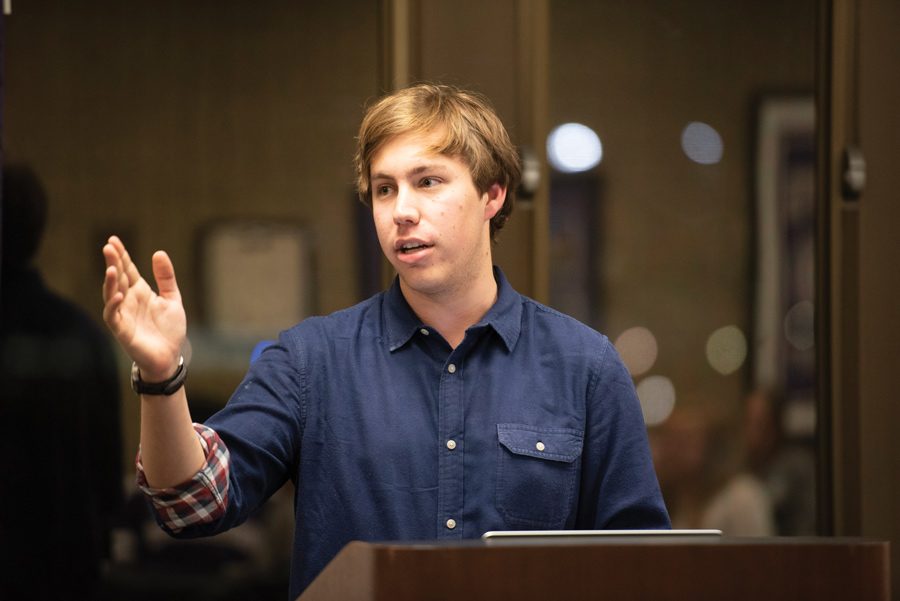ASG passes amendment recommending professors disclose ‘oppressive’ nature of Kanazawa’s research
Daily file photo by Colin Boyle
ASG Speaker of the Senate Adam Downing. Senators introduced an amendment recommending professors disclose the “oppressive” nature of Satoshi Kanazawa’s research.
January 17, 2019
The Associated Student Government Senate on Wednesday passed legislation calling on Northwestern administrators to terminate controversial evolutionary psychologist Satoshi Kanazawa’s visiting scholarship and denounce his research as “racist, misogynistic, and xenophobic.”
The ASG resolution, introduced last week, was passed with a last-minute amendment introduced by Weinberg Senator Margot Bartol recommending University faculty to refrain from using Kanazawa’s research in class curriculum unless they disclose the “oppressive nature” of his research.
Kanazawa’s research examining the relationships between race, intelligence and beauty has provoked outrage on campus. A 2012 research paper of his concluded that there were apparent differences in intelligence between races. While working in 2011 as a blogger for Psychology Today, Kanazawa published an article “Why are Black Women Less Physically Attractive Than Other Women?” His blog was later removed from the site and his article was deleted.
Days ago, Bartol, a Weinberg first year, said her statistics professor used Kanazawa’s correlating of intelligence and beauty as an example of “statistical analysis,” leading Bartol to propose the amendment.
“I could tell that a lot of people were made uncomfortable by its nature of being used in the classroom,” Bartol said.
The amendment ignited an hour-long debate over the manner in which professors should be required to disclose the nature of Kanazawa’s research. Some senators demanded that professors acknowledge Kanazawa’s research as explicitly racist, sexist and xenophobic.
“We already have in the resolution that we’re calling upon the University to do the exact same thing: call the research racist, misogynistic and xenophobic,” said Zubair Ahmed, the Transfer Students’ Organization senator. “It’s not that far off to ask professors to do the same.”
Other senators argued that such a statement would infringe on professors’ free speech rights and overstep the authority of ASG, recommending instead that professors be obligated only to disclose Kanazawa’s research as being controversial.
Weinberg Senator and first-year Christian Wade, the original author of the resolution, said that while ASG could ask the University to dismiss Kanazawa’s research as “xenophobic, racist and discriminatory,” compelling an individual professor to do the same would overstep ASG’s authority.
For SESP Senator Soteria Reid, though, “controversial” just wasn’t enough. Because students are in direct contact with professors, Reid argued, professors are in a unique position to denounce Kanazawa in a more effective way than University administrators could.
“The nature of (Kanazawa’s research) isn’t that it’s just controversial. It’s oppressive, and if we want to take a step further, it’s racist and sexist and xenophobic,” Reid, a SESP sophomore, said. “I don’t think we should be afraid of using those terms because they are in themselves controversial. I think that that’s antithetical to what we’re trying to do.”
The senators’ discussion resulted in four phrasing proposals and two failed motions.
Hoping to resolve the deadlock, Speaker of the Senate and Weinberg sophomore Adam Downing called a recess to allow them to informally deliberate.
The senate eventually compromised, recommending that professors use the term “oppressive” when describing Kanazawa’s research in the classroom. The amendment passed with a chorus of support, leaving only a single holdout to mutter a meek “nay.”
Email: [email protected]
Twitter: @jalan_atul
Related Stories:
ASG senator introduces legislation to terminate controversial psychologist’s scholarship
Northwestern is letting Kanazawa stay, and students are angry


